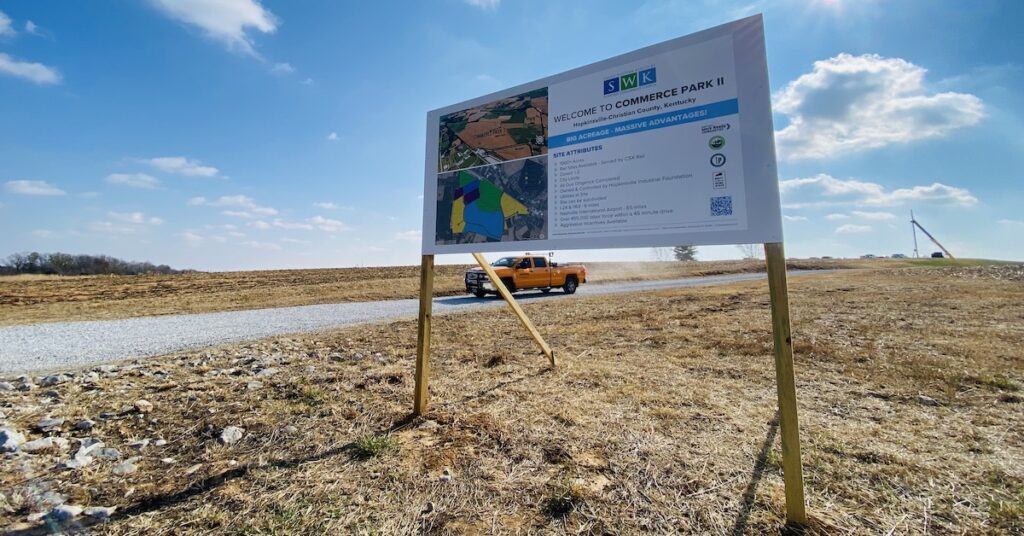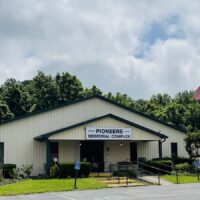A 100-acre industrial site in Hopkinsville’s Commerce Park II is back on the market after the U.S. Department of Energy halted a $200 million grant to Microvast Holdings Inc. — the Texas-based company that planned to invest $504 million for a battery technology plant that would employ 562 workers.
Carter Hendricks, executive director of South Western Kentucky Economic Development Council, confirmed Wednesday that the industrial site is not being held for Microvast. Hendricks told Hoptown Chronicle that local economic development officials are still communicating with Microvast as the company considers other financing options. But, he added, “We will continue to market that site.”
Microvast was one of 20 companies approved for grants totaling $2.8 billion to support domestic manufacturing of electric vehicle batteries.

Republican lawmakers criticized Microvast and its CEO, Yang Wu, for alleged ties to China.
The Associated Press reported that Energy Secretary Jennifer Granholm’s office confirmed negotiations with Microvast were canceled.
“At a Senate Energy Committee hearing in February, Sen. John Barrasso, R-Wyo., questioned whether the planned grant to Microvast would benefit China. Barrasso cited a company filing with the Securities and Exchange Commission in which Microvast said it may not be able to protect its intellectual property rights in China,” AP reported. And Barrasso told Granholm in a May 1 letter that Wu had “bragged to Chinese media about Microvast’s strong ties to the People’s Republic of China.″
Wu, saying he is a U.S. citizen, issued a statement and denied improper ties to China.
“Neither the Chinese government nor the Chinese Communist Party has any ownership in the company, nor do they control or influence company operations in any way,″ he said.
Microvast is publicly traded on the NASDAQ Stock Exchange.
Gov. Andy Beshear announced on March 30 that Microvast planned to build a plant in Hopkinsville that would use a patented process to produce polyaramid base film for lithium ion batteries used in electric vehicles. Construction was expected to begin this year and be completed by March 2025.
After the Department of Energy halted the $200 million grant for Microvast, Kentucky officials said the state would pause $21 million in economic incentives until the company provides information to explain what happened with the federal grant.
Prior to announcing the Hopkinsville plant, Microvast had started building a plant in Clarksville, Tennessee, that is expected to employ 287 workers. That project will continue, the company recently announced.
“Our priority remains completing our battery manufacturing facility in Clarksville, Tennessee. We are about half-way through our over $300 million investment in the plant,” said Chief Financial Officer Craig Webster.
The Commerce Park II parcel that Microvast identified for its Hopkinsville plant is near the Ascend Elements project, an estimated $1 billion facility currently under construction. It will produce lithium-ion materials for EV batteries. The plant is expected to employ 250 workers initially and then increase to around 400 employees.
Last October, Ascend, a Massachusetts-based company, was approved for a $480 million Department of Energy grant for its Hopkinsville project. The grant came from the same infrastructure package that would have benefitted Microvast.
Jennifer P. Brown is co-founder, publisher and editor of Hoptown Chronicle. You can reach her at editor@hoptownchronicle.org. Brown was a reporter and editor at the Kentucky New Era, where she worked for 30 years. She is a co-chair of the national advisory board to the Institute for Rural Journalism and Community Issues, governing board past president for the Kentucky Historical Society, and co-founder of the Kentucky Open Government Coalition. She serves on the Hopkinsville History Foundation's board.





